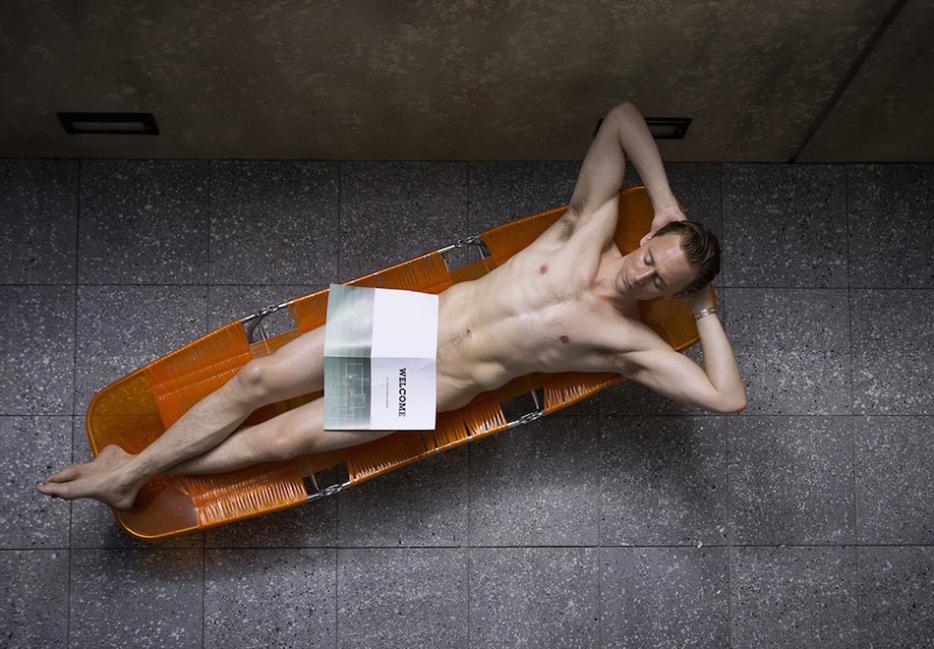Ben Wheatley has enjoyed a career like few other directors. He’s managed to make a film a year for more than half a decade now, and each has almost nothing in common with the last: there’s the rural hitman comedy of his debut feature Down Terrace, the occult ultraviolent thrills of Kill List, the road-trip serial-killer romance of Sightseers, the unclassifiable psychedelia of A Field in England. He swings from slapstick to kitchen-sink drama to buckets of blood and gore. The guy is unpredictable. The only thing one can reliably expect from a Ben Wheatley movie is that it will be decidedly—if elusively—Wheatleyesque.
It was perhaps not so surprising when Wheatley announced he’d be adapting J.G. Ballard—a novelist every bit as shockingly madcap as he’d proven himself on film. So here arrives High-Rise, Wheatley’s antic, erratic, totally ludicrous take on Ballard’s slim ’70s masterpiece. The real surprise is that England’s most riotous director managed to snag marquee stars in leading roles: Elisabeth Moss, Jeremy Irons, Sienna Miller, Luke Evans, and Tom Hiddleston, who together lead the rowdiest ensemble of the year. High-Rise the novel isn’t an especially story-driven work—it’s a portrait of a luxury condo’s steep descent into anarchy, with few pitstops or diversions along the way. It’s therefore up to Wheatley—alongside his partner and longtime collaborator, Amy Jump, who edited the film and wrote the script—to keep things chugging along with chaotic glee.
We shouldered our way through the throng of Hiddleston superfans during a press day at last September’s Toronto International Film Festival to sit down with Wheatley for a wide-ranging talk about the book and the film.
*
Hazlitt: It’s difficult to adapt a book whose attraction isn’t story or character so much as its prose. What was the approach?
Ben Wheatley: Well, Amy adapted it on her own—she went away with it and came back with it. It’s difficult to talk for her, but in the conversations we had about it we discussed that the book itself doesn’t have much dialogue in it. There’s some reported speech, a little bit, and so it was about trying to find those stories within the book and bring them to the surface. There are so many characters in this book and so many of them could come forward and be as important as anybody else. So Amy kind of looked at that and took a modern perspective: there are women who don’t get much of a voice. Children as well. And it was about trying to breathe life into those characters.
The women do have a central role in the novel, in that they emerge victorious.
Yes, and here it’s obviously the same narrative: the women rise to the surface and take over. But in the book it’s much more of a surprise. It’s almost like there’s a series of trials, in which each of the versions of control get their go—you’ve got Wilder, who is like a manly man on his own, a rebel character. Then you’ve got Royal, who is at the top of the high-rise and brings class and authority; he tries to take over with a kind of abuse, and that doesn’t work either. Then you’ve got Laing, who has a pragmatic, English approach. That doesn’t really work either. It’s the women in the end who win by surprise. They have taken the most of the abuse and we wanted to see more of them. Amy was talking about coming from a writing perspective.
But the other problem of adaptation is not about prose but about the literalness of film. As soon as you point the camera in a room there are no more secrets in that room. You’ve seen everything. How you ration that information is the equivalent of the prose. It’s like an upside-down world for a writer. You know, when I looked at Ballard’s Concrete Island, I thought, as a film, as soon as he gets out of the car you know everything, whereas in the book it’s only a sentence at a time that you discover the world. The reality of the prose is that the character is myopic and can’t see anything unless the writer allows him to see it. That’s absolutely the opposite of cinema.
A film of Concrete Island would seem particularly literal because of that single limiting environment: you’d see it all straight away and there would be no mystery, no discovery.
Yeah, well also there’s a lot of assumption, isn’t there? You assume it’s a small space, but then this building comes on, and then you assume something else, and then it transpires there’s a whole town there. It’s slowly rationed out. In a film you’d have to do some pretty fancy footwork to preserve those beats.
High-Rise presents a similar a problem too: the book is free to delve into psychological spaces but the film has to remain with the physical.
A lot of the humor in High-Rise is in character descriptions. You’re introduced to these characters and they’re defined by what they do and that’s funny. That’s not something that translates into film. Unless you go the route of, like, a Chandler-style first-person. But then you’ve screwed it at that point. I was trying to keep the humor of Ballard alive in it and not turn it into something austere. There’s a layer of comedy in Ballard, and it would be a mistake, I think, to make it super cold. It’s isn’t. It’s warm in many respects.
I think it’s misconstrued as cold.
It’s an easy read of Ballard. It’s a Wikipedia read.
One of the interesting things about the comedy of High-Rise is that it’s derived in part from the period: he was imagining a more outlandish version of the present for the near future. Of course now what he imagined seems mundane to us.
Yeah. It’s a metaphor, though: it could be a country, it could be a planet, it could be a man. That’s why Ballard is so smart—you can read it on all those levels. You can almost read it as a haunted house mystery thing where you’ve got each character doing their things in the plot. You’ve got all those elements.
Why did you make it a period film instead of a contemporary film? It could easily be contemporary…
I think that the period helped us in many ways. There are lots of issues now to do with broadcast and the constant monitoring and reporting of ourselves online. Ballard would have written a really brilliant book about that, if he were alive. And that would have been something different. In fact he predicted it in some of his own stuff. But that bends the shape of the material. They’re filming themselves a lot, with Super 8 and videotape. That’s quite surprising. That kind of self-obsession used to have a bad name, but now we’ve rolled over and that’s alright. Similarly, there was a point in history when a 1984 world was seen as bad. Now it helps me find my phone, so it’s okay. That’s a definite sea change in society. So the ’70s, on a really basic level, insulates you from that technology. You can’t be saved at any moment because of your mobile.
Not that they’d have used the mobiles to escape.
Yeah, of course the weird thing about that tower is that they did have phones available to them, they just didn’t use them. It wasn’t that they couldn’t escape; it was that they decided not to.
More of a Bunuel thing.
Right, it’s like The Exterminating Angel. Although … wait, they are locked inside in Exterminating Angel, aren’t they? They can’t escape?
They think they can’t.
Oh right. Yeah. Anyway, we also felt that by setting it in the past, we could smuggle in ideas that people would be more resistant to if you said it straight out loud. I think that’s why people make period films. It’s a way of reframing contemporary issues—but slightly sweetened, so you don’t have to think, “Oh fuck, I’m being told about society again.” This way you can’t say: “It’s not really me.”
I think there was a sense around the time of your third film, Sightseers, that each new project you made was an attempt to show the range of what you could do. The cynical view would be that it was careerist.
You don’t think about that when you do it. It might look like you do, but that’s more of a critical view. A lot of times, too, you don’t have a choice in what you make—those are the scripts you have, those are the projects people want to finance. But I did make a conscious decision not to make the same film again and again. In this industry if you make the same film twice you’ll make it forever. Genre gives and genre takes away. I was hungry to try different stuff and sought that out.
How does this fit in?
Well, A Field in England and High-Rise are more slippery customers. What’s the elevator pitch? Where do they sit in terms of genre? Try as you might there isn’t a space where it fits. I don’t know what that means in the grand scheme of things. But the next film I’ve made is very genre, so you know …
Is it easier to pitch when the material is by a well-known author?
It’s not really a pitch—it’s more of a business proposition, because you’re looking for financing. This isn’t Hollywood. I don’t go into a meeting and say, here’s my idea: lamps blowing in the wind, or whatever. Usually we’re much further up the road than that. We’ve got a script and we can go to financiers and ask if they want to be involved or not.
Right now we’re in a bustling room with celebrities, and outside the door are shrieking teenagers desperate to see Tom Hiddleston. How’s all of that been for you?
It’s actually not much different. There is this fan buzz, which is different. But the way the festival works is exactly the same and it’s pretty much exactly the same on set. People said that working with big actors would be different. It wasn’t. It was exactly the same. You’ve still got a job to do, at the end of the day. There’s no time for anything else but what we’ve got to do.
I think Kill List should have gaggles of fans screaming their heads off down the block too.
Oh it did. But for very different reasons.






